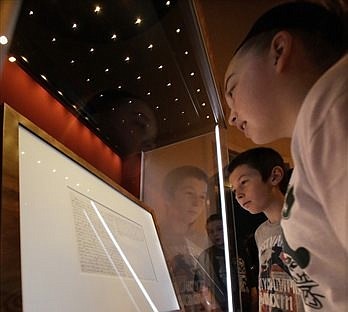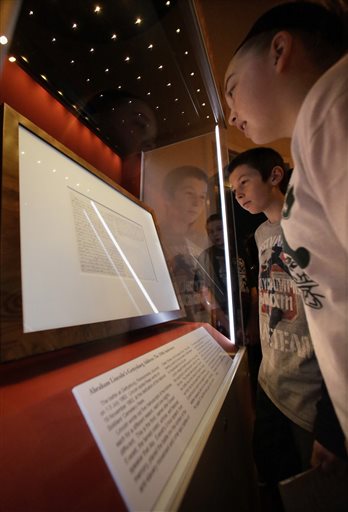How kids helped Illinois buy a copy of Gettysburg Address
Sunday, November 17, 2013
SPRINGFIELD, Ill. - As a boy in the 1940s, Gene Rubley got a nickel allowance every week - money that would pay for a 4-cent ticket to see a double feature at a Springfield movie theater, with a penny to spare for candy.
"That was my Saturday," the Illinois resident, now 83, said, adding that as the country recovered from the Great Depression and entered World War II, "We didn't have anything."
Yet Rubley gave that prized allowance up for a time as part of an effort by some of the youngest residents of Abraham Lincoln's home state to obtain a copy of the president's Gettysburg Address.
Rubley was one of the thousands of school children across the state who mobilized in the early 1940s to raise a majority of the $60,000 needed to purchase one of the five known copies of the speech written in Lincoln's hand.
"It meant something to us, being part of something like that," he said. "We were acquiring a piece of history."
As Tuesday's 150th anniversary of the famous 272-word address approaches, the memories of septuagenarians and octogenarians such as Rubley remain one of the only links to the effort, as few details were recorded after the original fundraising drive.
Illinois' manuscript, often called the "Everett copy," is housed at Springfield's Abraham Lincoln Presidential Library and Museum. James Cornelius, curator of the Lincoln collection at the museum, said the president wrote the copy at the request of Edward Everett, the main speaker at the Gettysburg National Cemetery in Pennsylvania in November of 1863. Everett was collecting the speeches from Gettysburg's dedication into one bound volume to sell for the benefit of stricken soldiers at a fair.
The exact wording of the address varies among the manuscript copies and media reports from the time. Cornelius said the Everett copy is the only handwritten copy of the address to include the phrase "under God," which the Associated Press at the time reported that Lincoln said.
Records show that in October 1943, Illinois State Historical Library trustee Oliver Barrett suggested school children help raise the money to buy the Everett copy from New York manuscript and rare books dealer Thomas Madigan. State superintendent Vernon Nickell communicated the task to schools, and the fundraising drive, as a result, was nicknamed "Nickell's Nickels."
"It was a public morale booster," Cornelius said, comparing it to scrap metal drives during wartimes.
Robert Iverson, the youngest in a family of eight children growing up in the Chicago suburbs, said he and several siblings recall penny jars being stationed in classrooms for the collection.
Children were asked to make an average donation of 5 cents apiece, and they raised more than $50,000 by March, state records show. Chicago department store heir Marshall Field III later donated the remainder.
The months-long effort became a friendly competition, as fundraising tallies were tracked across the state.
Kenneth Jones, then a high school student in southern Illinois' Vandalia, was selected by his peers to present the manuscript to state officials in Springfield in March of 1944, along with three other children from other parts of the state.
Jones died in 1997, and family members don't recall him recollecting his experiences with the collection, though they gave the AP local newspaper clippings that had been saved about the drive.
Two copies of the speech remain at the Library of Congress, another at the White House and the last at Cornell University. Cornelius said the Everett copy is in the best condition because of its years being sandwiched between other pages in the Gettysburg commemorative volume.
The two-page manuscript is currently on display at the museum until Dec. 1, when, Cornelius said, it will go back into the vault so that "it's good and legible 100 years from now."
Rubley's participation in the school children's coin drive spurred an interest in history that he says remains with him to this day. Now retired, he works as docent at the Lincoln museum, where he shows visitors the manuscript he helped bring in years ago.
"It just fascinates me that people are coming from all over the world to honor our president," he said. "Our Springfield boy makes good."

